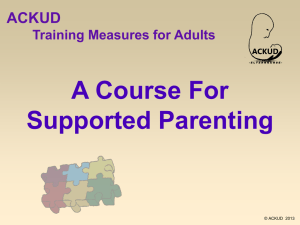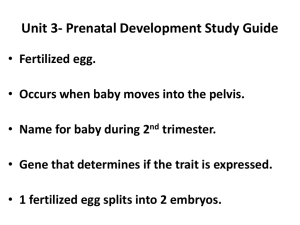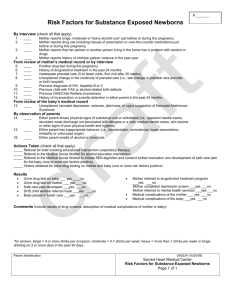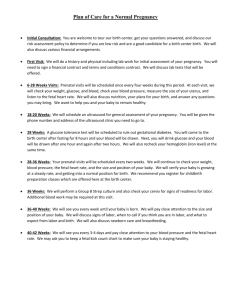Child Development
advertisement
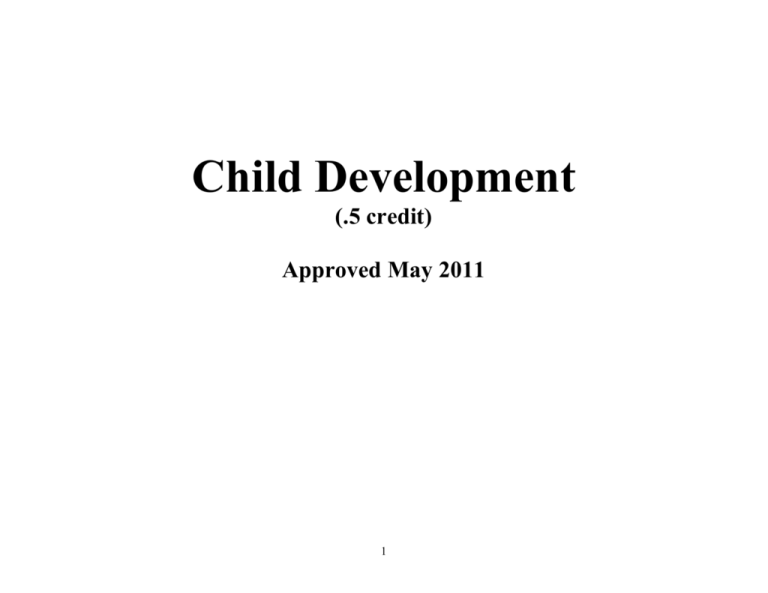
Child Development (.5 credit) Approved May 2011 1 Introduction to Child Development Children and You Essential Understandings: 1. Building knowledge of how children grow and develop is essential for understanding myself and others and how we relate to the world. Content Standards: 1. Learn to integrate multiple life roles and responsibilities 2. Demonstrate effective written and oral communication skills 3. Understand the impact of technology on society, culture, the economy and the environment Essential Question: Why is learning about and observing children essential for understanding myself? Learning Goals: Students will: Identify benefits of studying children Evaluate personal attitudes towards children Understand the history of childhood and how attitudes towards children have changed Know the five characteristics of development Understand influences of both heredity and environment on development Understand the importance of observing young children Evaluate four methods of observation Know guidelines for observing young children Know why confidentiality is essential when observing and interpreting the behavior of children Understand the functions that families fulfill 2 Suggested Strategies Suggested Assessments Suggested Resources Suggested Tech Integration Content Vocabulary Lifelong Learning/21st Century Skills Students will organize theorists according to areas of child development Students will create a poster on a selected theorist and report to the class Students will participate in a group activity on “Describing Development” Students will create an observation log Students will perform ongoing observations of children using various types of observation formats Students will read current articles on the topics of child development, observing children, and family and summarize how these relate to their lives Section 1-1, 1-2 quiz Observation log Check Your Understanding pg. 65, 67 End of chapter 1 test The Developing Child Holly E. Brisbane, 8th edition, 2000 Accompanying workbook internet on-line textbook and activities behaviors, development, growth, caregivers, developmental tasks, heredity, environment, theorist, observation, confidentiality, anecdotal record, baseline, frequency count, developmental checklist, interpret, objective, subjective, running record Productive habits of mind Quality work Read critically Communicate effectively Collaborate and cooperate Access and process information Core Ethical Values 3 Parenting Essential Understandings: 1. Building knowledge of how children grow and develop is essential for understanding myself and others and how we relate to the world. Content Standards: 1. Learn to integrate multiple life roles and responsibilities 2. Demonstrate effective written and oral communication skills 3. Understand the impact of technology on society, culture, the economy and the environment 4. Develop problem-solving and decision-making skills and strategies 5. Understand the roles and responsibilities of parenting Essential Question: How does understanding what parenting is and how nurturing affects a child’s development impact me? Learning Goals: Students will: Understand the changes that parenthood brings Understand how children are influenced by parents and caregivers Know considerations couple should look at before deciding to become parents Understand the techniques for encouraging appropriate behavior and setting limits Understand effective ways of dealing with misbehavior Understand how knowledge of child development is linked to reasonable expectations Understand how to nurture children 4 Suggested Strategies Suggested Assessments Suggested Resources Suggested Tech Integration Content Vocabulary Lifelong Learning/21st Century Skills Students will examine costs and time commitments of parenting by completing Baby Calculator and time costs internet activity Students will practice guiding children’s behavior in a positive manner Students will complete chapter study guide Students will conduct a parent interview as a formal writing assignment Chapter 3 Quizzes End of Chapter 3 test Parent Interview The Developing Child Holly E. Brisbane, 8th edition, 2000 Accompanying workbook Baby Calculator Internet Emotional maturity, parenthood, authoritarian style, democratic style, deprivation, nurturing, parenting, permissive style, conscience, guidance, negative reinforcement, positive reinforcement, self-discipline, timeout Productive habits of mind Quality work Read critically Communicate effectively Collaborate and cooperate Access and process information Core Ethical Values 5 Conception, Prenatal Development and Childbirth Essential Understandings: 1. Building knowledge of how children grow and develop is essential for understanding myself and others and how we relate to the world. Content Standards: 1. Learn to integrate multiple life roles and responsibilities 2. Demonstrate effective written and oral communication skills 3. Understand the impact of technology on society, culture, the economy and the environment 4. Develop problem-solving and decision-making skills and strategies 5. Understand the roles and responsibilities of parenting 6. Integrate knowledge, skills and practices required for careers in early childhood education and services Essential Question: How does understanding conception and prenatal development impact my understanding of how children develop? Learning Goals: Students will: Understand and explain conception Distinguish among the three stages of pregnancy Understand prenatal growth and development from conception up to childbirth Understand and evaluate how heredity and proper health care during pregnancy impact the health and wellness of the fetus Identify the different choices for labor and delivery Know signs that labor has begun Know the three stages of labor Describe a baby’s appearance at birth Recognize a baby’s reflexes 6 Suggested Strategies Suggested Assessments Suggested Resources Suggested Tech Integration Content Vocabulary Lifelong Learning/21st Century Skills Students will watch Nova film-“Miracle of Life” Students will read chapter and complete study guide Students will create a “stages of prenatal development” timeline using a variety of sources Students will read articles on topics related to pregnancy, heredity, and childbirth and summarize Students will participate in a pregnancy simulator activity to experience some of the physical changes in women during pregnancy Chapter 5, 6 quizzes and tests Evaluation of article summaries Reflections of videos and pregnancy simulator The Developing Child Holly E. Brisbane, 8th edition, 2000 Accompanying workbook Reality Works Pregnancy Profile simulator Internet Conception, amniotic fluid, embryo, fetus, ovum, placenta, prenatal development, sperm, umbilical cord, uterus, zygote, chromosomes, dominant, genes, infertility, recessive, surrogate, amniocentesis, birth defects, chorionic villi sampling, miscarriage, stillbirth, ultrasound, fetal alcohol syndrome, prenatal, obstetrician, pediatrician, alternative birth center, delivery, labor, lay midwife, nurse-midwife, postpartum, prepared childbirth, cervix, contractions, dilates, effaces, fontanels, cesarean birth, apgar scale, bonding, colostrum, incubator, postnatal, premature, rooming-in, grasp reflexes, reflexes, rooting reflex, startle reflex, temperament Productive habits of mind Quality work Read critically Communicate effectively Collaborate and cooperate Access and process information Core Ethical Values 7 Development from Birth to Age One Essential Understandings: 1. Building knowledge of how children grow and develop is essential for understanding myself and others and how we relate to the world. Content Standards: 1. Learn to integrate multiple life roles and responsibilities 2. Demonstrate effective written and oral communication skills 3. Understand the impact of technology on society, culture, the economy and the environment 4. Develop problem-solving and decision-making skills and strategies 5. Understand the roles and responsibilities of parenting Essential Question: How does knowledge and understanding of how children develop physically, emotionally, socially and intellectually impact my understanding of the world? Learning Goals: Students will: Understand a baby’s basic needs and how these needs can be best met Know three basic patterns that physical development follows Understand physical growth during the first year Understand the development of the senses and motor skills during the first year Know what functions each part of the brain controls Understand how brain cells work together Understand how the brain becomes organized Identify activities that support the development of brain pathways Recognize signs of emotional and social development in babies and explain how a baby’s care affects emotional development Understand how emotions change during infancy Understand the importance of attachment to emotional and social development Define personality and how it develops Recognize different personality types in babies Understand how behavior is learned Identify examples of signs of intellectual growth in infants Understand how babies learn Identify ways parents and caregivers can help babies learn Understand how parents and caregivers can help baby’s intellectual growth Understand how babies develop communication skills 8 Suggested Strategies Suggested Assessments Suggested Resources Suggested Tech Integration Content Vocabulary Lifelong Learning/21st Century Skills Students will read and complete study guides for chapters 8, 9, 10 Students will utilize developmental checklists as they observe children Students will observe children in the nursery school Students will participate in “Baby Think It Over” simulation(caring for an infant for the weekend) Students will conduct guided observations specific to gross and fine motor development Students will conduct guided observations specific to emotional, social and intellectual development Students will participate in each area of the nursery school while working with children Students will plan and facilitate at least 2 fine motor activities with preschoolers Students will plan and facilitate at least 1 group/gross motor activity with preschool children Students will reflect on all activities with preschool children in observation log Chapter quizzes and tests chapters 8, 9, 10 Student reflection of nursery school Reflections of child observations Log of Baby Think It Over experience The Developing Child Holly E. Brisbane, 8th edition, 2000 Accompanying workbook Reality Works “Baby Think It Over” exercise CRHS Nursery School Baby Think It Over Internet Interactive observation activity Depth perception, hand-eye coordination, motor skills, primary teeth, proportion, axon, cortex, dendrite, myelin, neurons, synapse, attachment, emotional development, failure to thrive, social development, stranger anxiety, attention span, cause and effect, concrete operations, formal operations, object permanence, perception, preoperational period, sensorimotor period, symbolic thinking, age appropriate Productive habits of mind Quality work Read critically Communicate effectively Collaborate and cooperate Access and process information Core Ethical Values 9 The Child From One to Three Essential Understandings: 1. Building knowledge of how children grow and develop is essential for understanding myself and others and how we relate to the world. Content Standards: 1. Learn to integrate multiple life roles and responsibilities 2. Demonstrate effective written and oral communication skills 3. Understand the impact of technology on society, culture, the economy and the environment 4. Develop problem-solving and decision-making skills and strategies 5. Understand the roles and responsibilities of parenting 6. Integrate knowledge, skills and practices required for careers in early childhood education and services Essential Question: How does knowledge and understanding of how children develop physically, emotionally, socially and intellectually impact my understanding of the world? Learning Goals: Students will: Identify changes in child’s height, weight, proportion and posture from ages 1 to 3 Distinguish between gross and fine motor skills and give examples of each Understand how to toilet train a child Identify patterns of emotional and social development from ages one to three Identify common emotions of young children and the changing ways they express those emotions Analyze how individual differences affect emotional development Understand the importance of a positive self-concept, and how it develops Know the three basic personality types of young children and effective discipline techniques for dealing with each personality type Understand the importance of play Understand how children make friends Identify ways children learn Know how children develop concepts Understand how one-to-three year olds develop in several areas of intellectual activity Identify ways to encourage young children to learn Know how children develop speech patterns and Identify common speech problems 10 Suggested Strategies Suggested Assessments Suggested Resources Suggested Tech Integration Content Vocabulary Lifelong Learning/21st Century Skills Students will continue to perform guided observations in the nursery school Students will facilitate activities with the nursery school children Students will conduct a case study of one child in the nursery school Chapter quizzes and tests for chapters 11, 12, 13 Observation logs Child Case Study The Developing Child Holly E. Brisbane, 8th edition, 2000 Accompanying workbook Reality Works “Baby Think It Over” exercise CRHS Nursery School Developmentally appropriate, dexterity, large motor skills, preschoolers, small motor skills, toddlers, sphincter muscles, training pants, empathy, negativism, self-centered, self-concept, separation anxiety, sibling rivalry, temper tantrums, cooperative play, parallel play, socialization, concepts, creativity, directed learning, imitation, incidental learning, intelligence, trial-and-error learning, articulation Productive habits of mind Quality work Read critically Communicate effectively Collaborate and cooperate Access and process information Core Ethical Values 11 Health and Safety Essential Understandings: 1. Building knowledge of how children grow and develop is essential for understanding myself and others and how we relate to the world. Content Standards: 1. Learn to integrate multiple life roles and responsibilities 2. Demonstrate effective written and oral communication skills 3. Understand the impact of technology on society, culture, the economy and the environment 4. Develop problem-solving and decision-making skills and strategies 5. Understand the roles and responsibilities of parenting 6. Integrate knowledge, skills and practices required for careers in early childhood education and services Essential Question: How does learning about the health and safety of children help me to better work with them? Learning Goals: Students will: Identify safety hazards for children of different ages Understand the importance of immunizations and health check-ups in the prevention of illnesses Understand allergies and how they can be treated Recognize emergency situations and plan appropriate responses Demonstrate first aid for common ailments 12 Suggested Strategies Suggested Assessments Suggested Resources Suggested Tech Integration Content Vocabulary Lifelong Learning/21st Century Skills Students will identify safety issues as they plan and facilitate nursery activities Students will read and complete study guide for chapter 18 Student self reflection of safety in activities planned Chapter 18 test The Developing Child Holly E. Brisbane, 8th edition, 2000 Accompanying workbook First aid, poison control, toxic, choking, allergy, immunization, immunize, vaccine, Productive habits of mind Quality work Read critically Communicate effectively Collaborate and cooperate Access and process information Core Ethical Values 13

